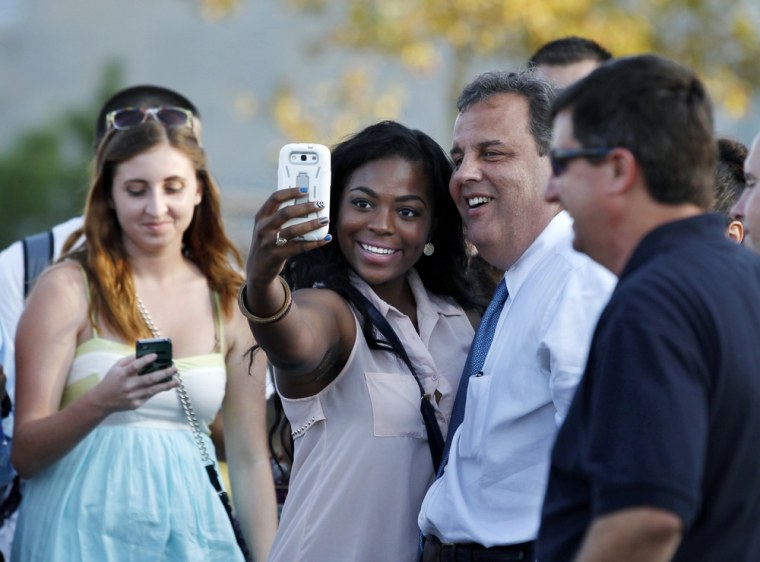
As congressional Republicans sink in popular opinion, GOP governors -- including some who might contend for their party’s presidential nomination in 2016 -- are happily using the opportunity to differentiate themselves from their beleaguered colleagues on Capitol Hill.
A record 70 percent of Americans disapprove of the way Republicans in Congress are handling their jobs, according to the new NBC News/Wall Street Journal poll, but outside Washington, Republican governors’ are faring much better.
Read the full poll here (.pdf)
New Jersey Gov. Chris Christie is cruising to re-election in deep-blue New Jersey by a 34-point margin over his Democratic challenger. Michigan Gov. Rick Snyder enjoys a 49-39 percent favorable/unfavorable rating in a state President Barack Obama carried easily last fall, and other Republican governors in blue states -- John Kasich in Ohio and Scott Walker in Wisconsin among them -- have stayed afloat as well.
In short, Republican governors are succeeding where their counterparts on Capitol Hill are failing. And that’s why it’s pretty difficult right now to find GOP governors willing to praise their party’s antics in Congress.
Christie put it especially succinctly in an interview with the Philadelphia Inquirer’s editors on Friday: “If I was in the Senate right now, I’d kill myself.”
Louisiana Gov. Bobby Jindal, the head of the Republican Governors Association who might seek the GOP presidential nomination for himself in 2016, gave voice to the divide on Tuesday: “As Republican governors, we want to reclaim our brand from Washington, D.C.,” he said on CNN. “For too many years, we've outsourced what it means to be a Republican -- we defined that in Washington, D.C.”
Indeed, one of the biggest problems for the Republican Party as a whole is the degree to which the party brand has been defined by GOP lawmakers inside the Beltway. The ongoing federal government shutdown and threat of default on the national debt -- not to mention, Congress’ failure to advance comprehensive immigration reform -- has only turned Republican governors more sharply against Washington.
“My approach would be, as the executive, is to call in the leaders of the Congress, the legislature, whatever you're dealing with, and say, 'We're not leaving this room until we fix this problem, because I'm the boss, I'm in charge,’” Christie said at the outset of the shutdown.
Republican Nevada Gov. Brian Sandoval warned of "catastrophic" effects for his state unless the shutdown is ended, noting that he was directing his frustration "toward the Congress, all of them, as well as the president, there are starting to be some real consequences here in my state."
And Wisconsin Gov. Scott Walker took to the pages of The Washington Post on Wednesday to favorably compare his own actions as governor against the ongoing dysfunction in D.C.
"Our reforms are working, and we continue to work with the legislative branch to do more to improve the lives of the people we represent," Walker wrote. "That’s what we’re doing in the Badger State. And that’s why Wisconsin continues to be open for business."
The shutdown has the added effect of creating a dividing line between Republican governors and Republican members of Congress heading into the 2016 presidential election, as well.
Governors are already thought to have an advantage over legislators in presidential nominating contests, able to marshal their accomplishments as executives versus lawmakers, who must often explain a number of less-than-ideal votes they’ve taken over the years.
To that end, presidential hopefuls in Congress -- Sens. Marco Rubio, Rand Paul and Ted Cruz among them -- will be forced to answer for their votes on the shutdown. Not just the ones that contributed to the shuttering of the government, but the eventual votes that facilitate an end to the funding impasse.
Those votes are ripe enough fodder for a rival candidate to use during the 2016 primaries. But more to the point, the crop of Republican governors have the option of railing against Washington, as deeply unpopular of a symbol among conservatives as it is among the broader public right now.
Or as former Florida Gov. Jeb Bush -- another Republican said to be eyeing the White House in 2016 -- told NBC’s Brian Williams, the spectacle in D.C. is “embarrassing.”
“We still have the partisanship,” he said. “And so, my hope is that at least on a few things, we can find enough common ground to move on those and fight the fights in the places where there's big disagreements."